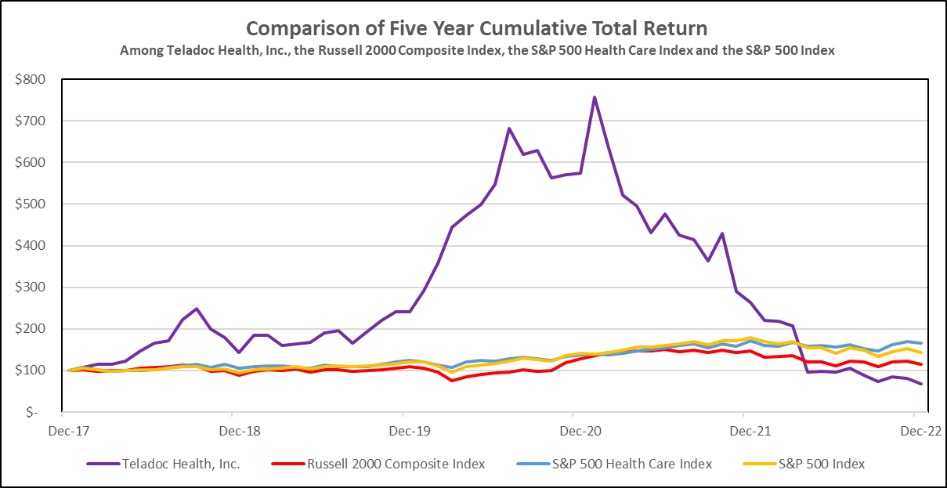co-registration partners, retailers, distributors, television advertising agencies, and direct marketers, to source new members and to promote or distribute our services and products. Also, in connection with the launch of new services or products for our BetterHelp business, we may spend a significant amount of resources on marketing. If our marketing activities are inefficient or unsuccessful, if important third-party relationships or marketing strategies, such as internet search engine marketing and search engine optimization, become more expensive or unavailable, or are suspended, modified, or terminated, for any reason, if there is an increase in the proportion of individuals visiting our websites or purchasing our services by way of marketing channels with higher marketing costs as compared to channels that have lower or no associated marketing costs or if our marketing efforts do not result in our services being prominently ranked in internet search listings, our business, financial condition, results of operations, and cash flows could be materially and adversely impacted.
In order to support the growth of our business, we have and may need to incur additional indebtedness or seek capital through new equity or debt financings, which sources of additional indebtedness or capital may not be available to us on acceptable terms or at all.
Our operations have consumed substantial amounts of cash since inception and we intend to continue to make significant investments to support our growth, respond to business challenges or opportunities, develop new applications and services, enhance our existing solutions and services, enhance our operating infrastructure, and potentially acquire complementary businesses and technologies. For the years ended December 31, 2022 and 2021, our net cash provided by operating activities was $189.3 million and $194.0 million, respectively. As of December 31, 2022, we had $918.2 million of cash and cash equivalents which are held for working capital purposes. As of December 31, 2022, we had outstanding $1,000.0 million of 1.25% convertible senior notes due 2027 (the “2027 Notes”) and $0.7 million of 1.375% convertible senior notes due 2025 (the “2025 Notes,” and together with the 2027 Notes, the “Notes”). As of December 31, 2022, Livongo Health, Inc. (“Livongo”) also had outstanding $550.0 million of 0.875% convertible senior notes due 2025 (the “Livongo Notes”), and we had agreed to guarantee Livongo’s obligations under the Livongo Notes. On January 1, 2023, we assumed all of Livongo’s rights and obligations under the Livongo Notes.
We may be required to use a substantial portion of our cash flows from operations to pay interest and principal on our indebtedness. Our ability to make scheduled payments of the principal of, to pay interest on, or to refinance our indebtedness, including the Notes and the Livongo Notes, depends on our future performance, which is subject to economic, financial, competitive, and other factors beyond our control. Such payments will reduce the funds available to us for working capital, capital expenditures, and other corporate purposes and limit our ability to obtain additional financing for working capital, capital expenditures, expansion plans, and other investments, which may in turn limit our ability to implement our business strategy, heighten our vulnerability to downturns in our business, the industry, or in the general economy, limit our flexibility in planning for, or reacting to, changes in our business and the industry, and prevent us from taking advantage of business opportunities as they arise. Our business may not continue to generate cash flow from operations in the future sufficient to service our debt and make necessary capital expenditures. If we are unable to generate such cash flow, we may be required to adopt one or more alternatives, such as selling assets, restructuring debt, or obtaining additional equity capital on terms that may be onerous or highly dilutive. If we are unable to engage in any of these activities or engage in these activities on desirable terms, it could result in a default on our debt obligations, which would adversely affect our business, financial condition, and results of operations. We may settle conversions of the Notes and the Livongo Notes through payment or delivery, as the case may be, of cash, shares of our common stock, or a combination of cash and shares of our common stock. The amount of cash paid, or number of shares delivered, in connection with any conversion may be material and could result in a significant depletion in the cash available to fund our operations or significant dilution to our stockholders.
Our future capital requirements may be significantly different from our current estimates and will depend on many factors, including our growth rate, subscription renewal activity, the timing and extent of spending to support development efforts, the expansion of sales and marketing activities, the introduction of new or enhanced services, and the continuing market acceptance of virtual care. Accordingly, we may need to engage in equity or debt financings or collaborative arrangements to secure additional funds. If we raise additional funds through further issuances of equity or convertible debt securities, our existing stockholders could suffer significant dilution, and any new equity securities we issue could have rights, preferences, and privileges superior to those of holders of our common stock. Any debt financing secured by us in the future could become more expensive due to rising interest rates or involve restrictive covenants


